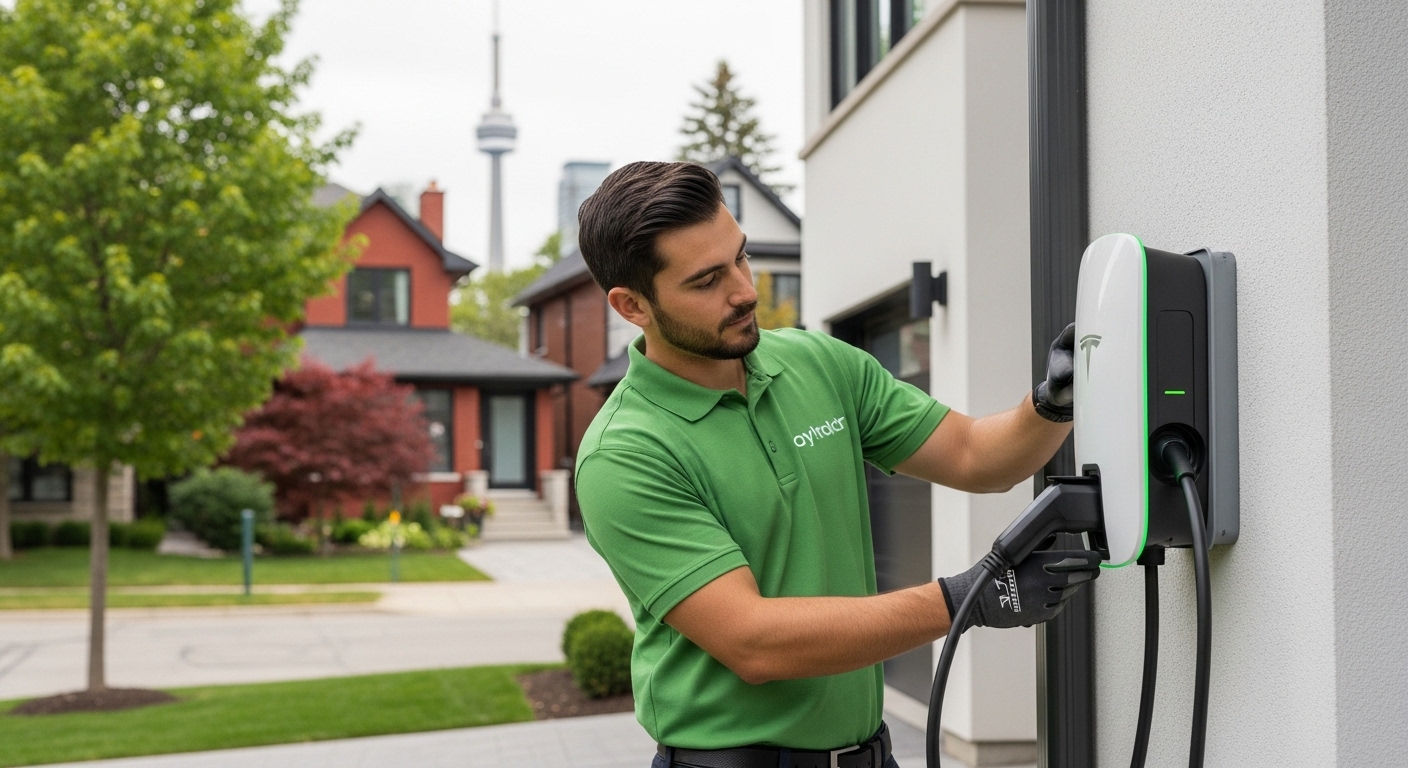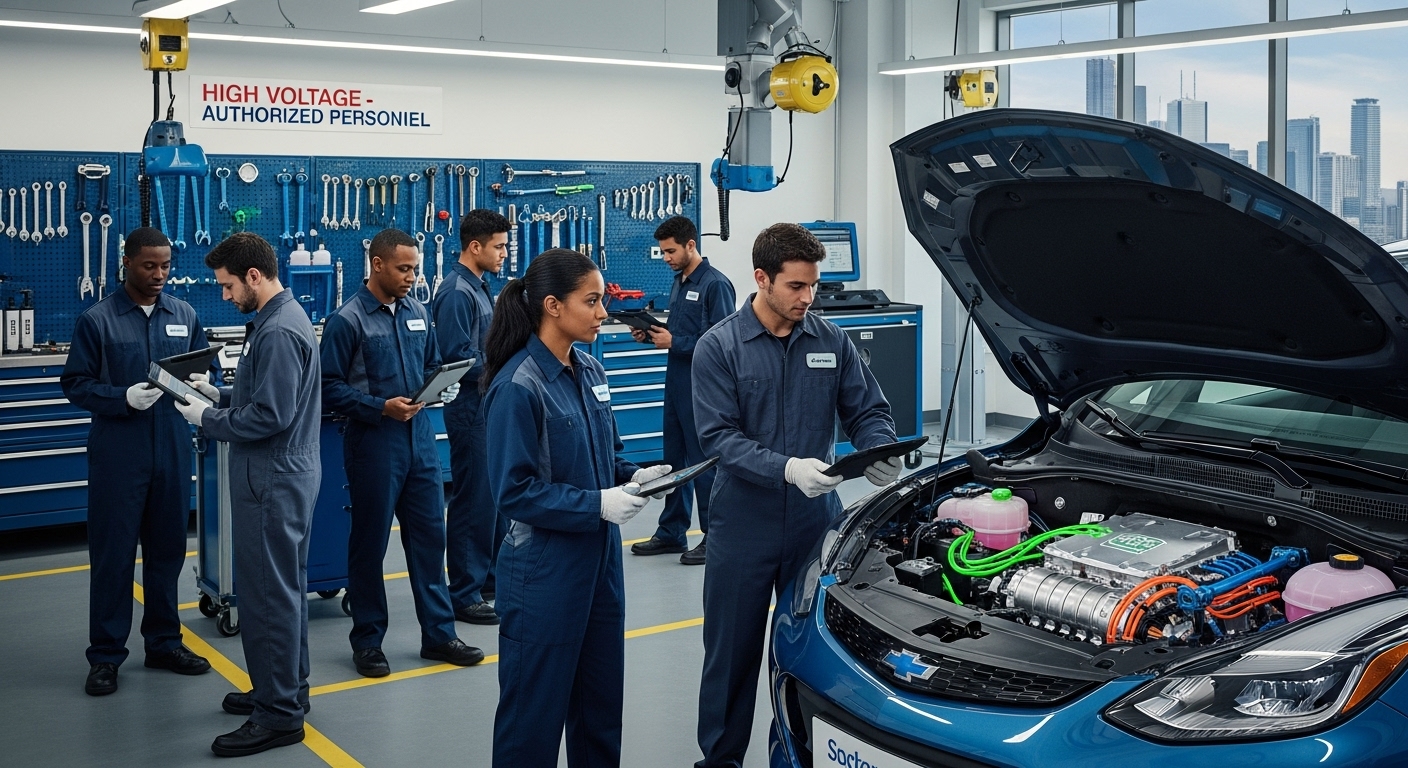EV Charger Installation in Toronto – [Learn What’s Involved & Get Expert Help]

Electric vehicles (EVs) aren’t just a trend anymore, they’re quickly becoming a key part of Canada’s clean energy future. From federal rebates to city-led green initiatives, more Canadians than ever are switching to electric cars, and Toronto is leading the charge. But while buying an EV is exciting, one big question often follows: “How do I install a home EV charger safely and affordably?”
If you live in Toronto or anywhere in the GTA, setting up a reliable home charging station can make all the difference in your EV experience. No more waiting in line at public stations or worrying about overnight charging, your own charger gives you freedom, convenience, and long-term savings.
In this guide, we’ll break down everything you need to know about EV charger installation in Toronto, from the different charger types and local permit rules to cost estimates, rebate programs, and trusted local installers.
Why You Should Read This Guide
Whether you’re a new EV owner, a condo resident curious about shared charging setups, or a business thinking about fleet charging, this post will help you:
Understand Toronto’s EV installation requirements and safety codes
Learn how much it really costs to install a charger in 2025
Discover available Ontario and federal rebates to lower your costs
Find certified local electricians you can trust with your installation
By the end, you’ll know exactly what’s involved in getting your EV charger installed the right way, the Canadian way.
Types of EV Chargers Available in Canada
If you’re thinking of installing an EV charger at home, you’ll quickly realize there isn’t just one kind, and the right choice depends on your driving habits, home setup, and how fast you want your car to charge.
Level 1 Chargers – The Basics
Level 1 is what comes standard with most EVs. You simply plug it into a regular 120V outlet, the same one you’d use for a toaster.
It’s slow (adds roughly 6–8 km of range per hour) but reliable for light drivers or plug-in hybrids. For many Torontonians who drive short distances daily, this might be all you need.
Level 2 Chargers – The Sweet Spot for Homeowners
Level 2 chargers are what most homeowners in Toronto are installing. They run on 240V, similar to a dryer outlet, and can add 30–40 km of range per hour.
That means you can fully charge overnight, even in the dead of winter.
These chargers are available from trusted brands like Flo, ChargePoint, Grizzl-E (a Canadian brand from Markham, Ontario), and Tesla Wall Connector.
Pro Tip: Always look for CSA or UL certification when buying a charger in Canada — it ensures the product meets local safety standards.
Level 3 (DC Fast Chargers) – Commercial and Fleet Use
Level 3 chargers, or DC Fast Chargers, are what you see at highway rest stops or mall parking lots. They require a 480V commercial power supply, so they’re not practical for homes.
However, small businesses or condo developments in the GTA are starting to install these for customer convenience.
Toronto’s EV Charger Installation Rules
Toronto is progressive when it comes to EV infrastructure, but you can’t just mount a charger and plug it in, there are city rules to follow.
Electrical Safety and Permits
In Ontario, all EV charger installations must be done by a licensed electrician registered with the Electrical Safety Authority (ESA).
Before work begins, your electrician will file a Notification of Work with the ESA, this ensures your setup meets the Ontario Electrical Code.
After installation, the ESA may inspect your system before it’s approved for use.
Local Tip: The City of Toronto’s Green Development Standard also encourages EV-ready parking in new builds, a good sign that the city is planning for a fully electric future.
Condo and Multi-Unit Dwelling Rules
If you live in a condo, you’ll need board approval before installing anything. Ontario’s Condominium Act now makes it easier, condo boards cannot unreasonably deny EV charger requests, but they can set conditions for safety and cost-sharing.
There are also grant programs to help offset the costs for shared buildings, especially through Natural Resources Canada’s ZEV Infrastructure Program.
Homeowner Responsibilities
Homeowners are responsible for ensuring their electrical panel has enough capacity. Older Toronto homes, especially pre-1970s ones, may require a panel upgrade to handle the extra load.
A professional electrician can perform a load calculation to confirm this before installing your charger.
Step-by-Step: The EV Charger Installation Process in Toronto
Installing an EV charger isn’t complicated, but it’s definitely not a DIY job. Here’s what the process looks like from start to finish.
Step 1: Site Assessment
Your installer will visit your home to check:
Your electrical panel capacity
Distance between the panel and the parking spot
The best mounting location for convenience and safety
If your home’s service is 100 amps or less, they may recommend a panel upgrade or a smart splitter (devices like DCC-10, made in Montreal, are ESA-approved for this).
Step 2: Choosing the Right Charger
Based on your EV model, budget, and space, your electrician might recommend a hardwired unit for outdoor setups or a plug-in charger if you want flexibility to move it later.
Most Toronto homeowners choose Level 2 chargers between 32A and 48A, depending on their panel size.
Step 3: Installation Day
Installation usually takes 2–4 hours. The electrician mounts the charger, runs conduit or cable, and connects it to your breaker panel.
If it’s outdoors, they’ll use weatherproof equipment rated for Canadian winters, look for a NEMA 4 enclosure rating.
Step 4: Inspection and Activation
After installation, the ESA may conduct a quick inspection. Once approved, your charger is activated, and you’re good to go.
Some electricians even help you submit rebate applications or connect your charger to smart home apps like Hydro One’s Time-of-Use optimization tools.
Costs of EV Charger Installation in Toronto
If you’re thinking about installing an EV charger at home in Toronto, the first question that usually pops up is: how much is it going to cost?
From my experience helping homeowners across the GTA, the average price for a Level 2 charger installation falls between $1,200 and $2,500, including parts and labour. But that number can swing depending on a few factors:
Distance from your electrical panel: The longer the wiring run, the more materials and labour are needed.
Panel capacity: Older homes (especially pre-1980s) might need a panel upgrade to handle the extra load, that can add $800 – $1,500.
Charger brand and features: Smart chargers with Wi-Fi or load-management systems cost more up front but offer better energy tracking.
Installation complexity: Detached garages or outdoor units often require trenching, conduit, or weatherproof fittings.
Pro Tip: Ask your installer for a detailed quote that lists both equipment and labour. In Toronto, licensed electricians typically charge $100 – $130 per hour, depending on experience and certification.
So, a straightforward install might come in under $1,500, while a more complex setup could edge closer to $3,000 — still a solid investment for future-proofing your property.
Government Rebates & Incentives for Ontarians
The good news? You don’t have to shoulder the full cost alone.
Both federal and local programs are helping Ontarians go electric faster.
Here’s what’s available right now:
Federal iZEV Program: While this mainly targets vehicle purchases, pairing it with provincial incentives can help you offset costs overall.
Natural Resources Canada (NRCan) Zero-Emission Vehicle Infrastructure Program (ZEVIP): For businesses and multi-unit residential properties, covers up to 50 % of charger and installation costs, up to $5,000 per connector.
City of Toronto Climate Action Rebates (Pilot): The City has tested several small-scale incentive programs for residential EV charging, especially for condos and multi-unit dwellings. Keep an eye on updates via toronto.ca/climate-initiatives.
Toronto Hydro Home Assistance: Some utility partners occasionally offer rebates for energy-efficient home upgrades, check their website for current EV programs.
Quick tip: Always check eligibility before buying or installing your charger. Many rebates require CSA-certified equipment and a permit-approved installation by a licensed electrical contractor registered with the Electrical Safety Authority (ESA).
Choosing a Certified EV Charger Installer in Toronto
If you live in the GTA, you’ll quickly notice: there’s no shortage of electricians offering EV charger installations. But not all are created equal.
When I evaluate installers, I look for three non-negotiables:
ESA-Licensed Contractors: The Electrical Safety Authority keeps a public list of certified professionals. You can verify anyone at findacontractor.esasafe.com.
Experience with EV projects: Not every electrician understands load balancing, smart-charger networking, or condo wiring systems. Ask how many EV installs they’ve done.
Warranty & after-service: Reputable installers offer at least a 1-year workmanship warranty and support for manufacturer claims.
Some of the more recognized local names include:
Signature Electric – well-known for condo EV charging projects.
AC Electrical Contractors Ltd. – solid reputation for home installs.
New Dawn Energy Solutions – great for integrating solar or battery systems.
Ask these before you book:
Do you handle the ESA permit and inspection?
Can you recommend a charger brand based on my vehicle and panel setup?
What’s the turnaround time from quote to installation?
A quick 10-minute call with two or three licensed pros will tell you a lot, and can save you hundreds in the long run.
EV Charging Options for Condos and Businesses
Toronto’s condo boom has brought a new challenge: how do we charge EVs in shared buildings?
If you live in a condo or manage a property, you have a few options:
For Condo Residents
Individual chargers in personal parking spots: Requires permission from your condo board and a professional load assessment.
Shared charging stations: Some buildings install networked chargers where residents pay per session.
The Ontario Condominium Act supports EV adoption, meaning your board can’t “unreasonably refuse” your request to install a charger, but they can set conditions around safety and cost sharing.
For Businesses
Toronto’s small and mid-sized businesses are catching on fast. Offering charging stations can attract eco-conscious customers and even reduce fleet fuel costs. Through programs like ZEVIP, businesses can access up to 50 % reimbursement on installation costs when chargers are publicly accessible or used by employees.
I’ve seen local cafés and offices in areas like Liberty Village and North York benefit from this, they’ve turned parking lots into brand assets while contributing to Toronto’s carbon-neutral goals.
Smart Move: Choose networked chargers (like FLO, ChargePoint, or Grizzl-E Smart) that allow monitoring usage and controlling access, great for multi-user environments.
Maintenance & Safety Tips for Canadian Winters
If you live anywhere in the GTA, you already know, Toronto winters can be brutal. Between slush, ice, and the occasional polar vortex, your EV charger deserves some extra care. The good news is, with a few simple steps, your setup will last for years without a hiccup.
Protect Your Charger from Snow & Ice
If you’re using an outdoor Level 2 charger, make sure it’s rated for -40°C operation (most CSA-approved models are). Mount it on a sheltered wall or under an awning if possible. A small weatherproof cover or enclosure can go a long way toward preventing moisture buildup in the plug or cable.
Keep Cables Flexible in the Cold
EV charging cables tend to stiffen in freezing weather. Before plugging in, gently uncoil the cable and avoid bending it sharply, it can crack over time. Many Canadian EV owners keep a cable hook installed beside the charger to prevent the cord from freezing to the ground.
Charging Efficiency in Winter
Cold temperatures affect battery chemistry, meaning your EV might charge slower or lose range overnight. Try pre-conditioning your car (heating it while plugged in) before driving off. This not only warms the battery but also saves you time defrosting.
Regular Maintenance
Once a year, inspect your charging cable and wall connector for corrosion or loose fittings. If you notice frayed wires, get a licensed electrician (ideally someone certified by the Electrical Safety Authority of Ontario) to check it out. A quick 20-minute checkup can save you from costly repairs later.
How to Future-Proof Your Home for the EV Revolution
The EV movement isn’t slowing down, Canada’s aiming for all new light-duty vehicles to be zero-emission by 2035, and Toronto’s already setting up the infrastructure. If you’re installing an EV charger today, think a few years ahead.
Upgrade Your Electrical Panel
Older Toronto homes, especially those built before the 1980s, often have 100-amp panels. With heat pumps, electric stoves, and EVs all drawing power, upgrading to a 200-amp service is a smart move. It gives you headroom for future tech without overloading your system.
Consider Smart Charging & Solar Integration
Many new EV chargers come with smart scheduling features that let you charge during off-peak hours (when hydro rates are lowest). Some homeowners are even pairing their chargers with rooftop solar systems or battery storage. Toronto Hydro’s net metering program makes it easier to offset your electricity costs this way.
Prepare for Multiple EVs
If you plan to add another electric car down the line, ask your installer to run extra conduit or pre-wire a second charging spot. It’s far cheaper to do this upfront than to reopen walls later.
In short: think long-term. Your next car or even your neighbour’s, will likely be electric, and being ready means less stress and more savings.
Get Expert Help: Connect with Local EV Charger Pros
While DIY projects are fun, EV charger installation isn’t one of them, especially in Toronto, where strict electrical codes apply. A professional installer ensures safety, compliance, and maximum performance from day one.
Finding Certified Installers in Toronto
Start by looking for electricians certified by the Electrical Safety Authority (ESA). You can search their Find a Licensed Electrical Contractortool, it lists verified pros across Ontario. Many are familiar with brands like Tesla Wall Connector, FLO, Grizzl-E, and ChargePoint Home Flex, which are popular among Canadian EV owners.
What to Expect from a Professional Assessment
Most reputable installers will:
Inspect your electrical panel and available amperage
Recommend the best charger type and placement
Handle permits and ESA inspections
Test the installation for safety and efficiency
A good one will even help you apply for rebates, since programs can change annually.
Pro Tip:
If you’re in the GTA, ask if your installer partners with Toronto Hydro or Plug’n Drive they often have special programs or discounted installations for new EV owners.
By getting expert help, you’re not just avoiding headaches, you’re ensuring your charger performs reliably through every Canadian season.



